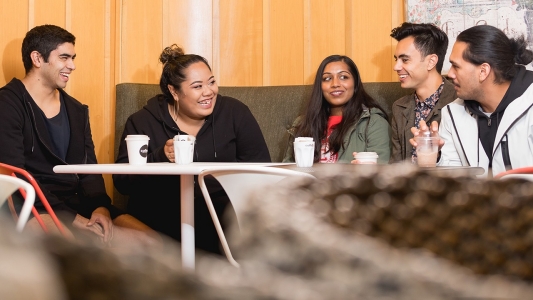Larissa Renfrew coordinates our Māori and Pacific Psychology Research Group, organising informal research progress meetings, discussion about Indigenous focused research, professional development activities, sharing information about relevant external-events, scholarships and opportunities, as well as hosting guest speakers from psychology and related disciplines.
The support and skill development attained from being a part of the group is crucial and highly valued by students.
All members of the MPPRG group receive email notifications highlighting upcoming seminars, work and scholarship opportunities. There are also monthly face-to-face supervision meetings with students, and lecturers are at hand to assist students with their research projects.
MPPRG has two broad aims related to its kaupapa of motivating, inspiring and supporting Māori and Pasifika psychology student research:
1. Increasing the recruitment of Māori and Pasifika students into the school’s postgraduate programme, by exposing advanced undergraduate Māori students to Māori and Pacific centred research. Additionally, in some cases, actively engaging such students in Māori and Pacific centred research.
2. Supporting current Māori and Pacific postgraduate students as researchers (present or future), strengthening their knowledge and research skills, and broadening and strengthening their research connections, with the possibility for future collaborative research and further postgraduate study.
Expected benefits include:
- Recruiting and retaining top Māori and Pasifika students into postgraduate study at this University.
- Producing quality (published) research in Māori/Pacific psychology.
- Building a community of skilled Māori and Pasifika researchers who are also attached to psychological research who will contribute to the University and the wider community.
Students of Māori and/or Pacific descent, or those completing research on Māori or Pacific issues, are welcome to attend.
The MPPRG (Maaori and Pacific Research Group Coordinator is Malakai Vaioleti (malakai.violeti@auckland.ac.nz). Kaiwhakaako Mātai Hinengaro Hineatua Parkinson (atua.parkinson@auckland.ac.nz) and Tuākana senior coordinator Christina Middelbeek-Harrison (christina.middelbeek-harrison@auckland.ac.nz) and coordinator Olivia Clough (oclo370@aucklanduni.ac.nz) can provide support with personalised written references to professional programmes.
Dr Shiloh Groot, Dr Jade Le Grice, Dr Sam Manuela and Dr Sarah Kapeli provide academic research mentorship to this group and are happy to answer any enquiries from students:
- Dr Shiloh Groot
Phone: +64 9 923 8555
Email: s.groot@auckland.ac.nz - Dr Jade Le Grice
Phone: +64 9 923 6870
Email: j.legrice@auckland.ac.nz
- Dr Sam Manuela
Phone: 64 9 923 2824
Email: s.manuela@auckland.ac.nz - Dr Sarah Kapeli
Phone: TBC
Email: s.kapeli@auckland.ac.nz
Nau mai haere mai.



